Preparing for an interview can be nerve-wracking, but with the right strategies, you can approach it with confidence and poise. Whether you’re a seasoned professional or a fresh graduate, knowing how to prepare for an interview can significantly increase your chances of getting hired.
Here is a comprehensive guide that covers everything you need to do before, during, and after the interview to make a lasting impression on your potential employer.
What To Do Before The Interview
1. Research the Company
Researching the company is one of the most critical steps in preparing for an interview. Understanding the company’s mission, values, and culture can help you tailor your responses and demonstrate your genuine interest in the role.
Tips:
- Company Website: Explore the company’s website to learn about its products, services, and mission statement.
- Recent News: Look for recent news articles or press releases to stay updated on the company’s latest developments.
- Social Media: Follow the company’s social media profiles to learn about its culture and public interactions.
Example: If you’re interviewing for a marketing or copywriting position at a tech company, knowing about their latest product launch can help you discuss relevant marketing strategies during the interview.
2. Review Common Interview Questions
Familiarize yourself with common interview questions and practice your responses. This preparation can help you feel more confident and articulate during the interview.
Tips:
- Behavioral Questions: Prepare for behavioral questions that assess how you’ve handled situations in the past (e.g., “Tell me about a time when you faced a challenge at work”).
- Technical Questions: Review any technical questions related to your field of expertise.
- STAR Method: Use the STAR method (Situation, Task, Action, Result) to structure your responses.
Example: For a question like “Tell me about a time when you led a team,” you can use the STAR method to describe the situation, the task you were assigned, the actions you took, and the results you achieved.
3. Prepare Your Outfit
Your appearance can make a significant impression on your interviewer. Choose an appropriate outfit for the company’s dress code while ensuring you look professional and polished.
Tips:
- Research Dress Code: Find out the company’s dress code and dress one step above.
- Comfort and Fit: Ensure your outfit is comfortable and fits well to avoid any distractions.
- Grooming: Pay attention to grooming details, such as neat hair, clean nails, and minimal fragrance.
Example: If the company has a business casual dress code, you might opt for a blazer and slacks or a professional dress.
4. Gather Necessary Documents
Having all the necessary documents ready can help you stay organized and make a good impression.
Tips:
- Resume: Bring multiple copies of your updated resume.
- Portfolio: If applicable, bring a portfolio of your work.
- References: Have a list of references ready, including their contact information.
- Digital Business Card: Consider using a digital business card for easy contact sharing.
Example: Prepare a professional folder containing your resume, portfolio samples, and a list of references to hand over if requested.
What To Do During the Interview
1. Arrive Early
Arriving early for your interview shows punctuality and eagerness.
Tips:
- Plan Your Route: Plan your route in advance and account for potential delays.
- Arrive 10-15 Minutes Early: This gives you time to settle and review your notes before the interview.
Example: If your interview is scheduled for 10 AM, aim to arrive at the location by 9:45 AM.
2. Make a Strong First Impression
First impressions are crucial in an interview setting. Present yourself with confidence and professionalism.
Tips:
- Handshake: Offer a firm handshake while maintaining eye contact.
- Body Language: Use positive body language, such as sitting up straight and nodding attentively.
- Smile: A genuine smile can help establish a rapport with the interviewer.
Example: When you meet the interviewer, greet them with a smile, a firm handshake, and say, “Thank you for meeting with me today.”
3. Answer Questions Confidently
Responding to questions confidently and clearly can demonstrate your competence and communication skills.
Tips:
- Listen Carefully: Listen to the entire question before responding.
- Take Your Time: It’s okay to take a moment to think before answering.
- Provide Examples: Use specific examples to illustrate your points.
Example: When asked, “Why do you want to work here?” you might respond, “I admire your company’s commitment to innovation and customer satisfaction. I believe my experience in product development aligns with your goals, and I am excited about the opportunity to contribute to your team.”
4. Ask Thoughtful Questions
Asking thoughtful questions at the end of the interview shows that you have done your research and are genuinely interested in the role.
Tips:
- Prepare Questions: Prepare at least 2-3 questions in advance.
- Focus on Fit: Ask questions that help you understand how you would fit into the company.
- Be Specific: Tailor your questions to the specific role and company.
Example: One good question could be, “Can you tell me more about the team I would be working with and how this role collaborates with other departments?”
What To Do After the Interview
1. Send a Thank-You Email
Sending a thank-you email after the interview is a courteous way to express your appreciation and reiterate your interest in the role.
Tips:
- Send Promptly: Send the email within 24 hours of the interview.
- Personalize: Mention specific points from the interview to personalize the message.
- Express Gratitude: Thank the interviewer for their time and consideration.
Example: “Dear [Interviewer’s Name], thank you for meeting with me today. I enjoyed learning more about [Company Name] and the [Job Title] role. I am excited about the opportunity to contribute to your team and look forward to hearing from you soon. Best regards, [Your Name]”
2. Reflect on the Interview
Take some time to reflect on the interview and identify areas for improvement.
Tips:
- Assess Performance: Consider what went well and what could have been better.
- Seek Feedback: If possible, ask for feedback to improve future interviews.
- Document Insights: Write down any insights or information gained during the interview.
Example: Reflect on how you answered questions and interacted with the interviewer. Identify any moments you felt less confident and think about how you could improve in future interviews.
3. Follow Up
If you haven’t heard back within the specified timeframe, consider sending a follow-up email to inquire about the status of your application.
Tips:
- Be Polite: Keep the tone of your email polite and professional.
- Reiterate Interest: Reiterate your interest in the role.
- Provide Additional Information: Offer any additional information that may support your application.
Example: “Dear [Interviewer’s Name], I hope this email finds you well. I am writing to follow up on the status of my application for the [Job Title] role. I remain very interested in the opportunity and am happy to provide any additional information. I appreciate your consideration. Best regards, [Your Name]”
Conclusion
There you have it; that’s how you prepare for an interview and increase your chances of getting hired. The bottom line is that interview preparation involves thorough research, careful planning, and thoughtful follow-up. Taking the right steps before, during, and after the interview can increase your chances of making a positive impression and securing the job. Remember to research the company, practice your responses, dress appropriately, and follow up with a thank-you email to leave a lasting impact. Good luck!


